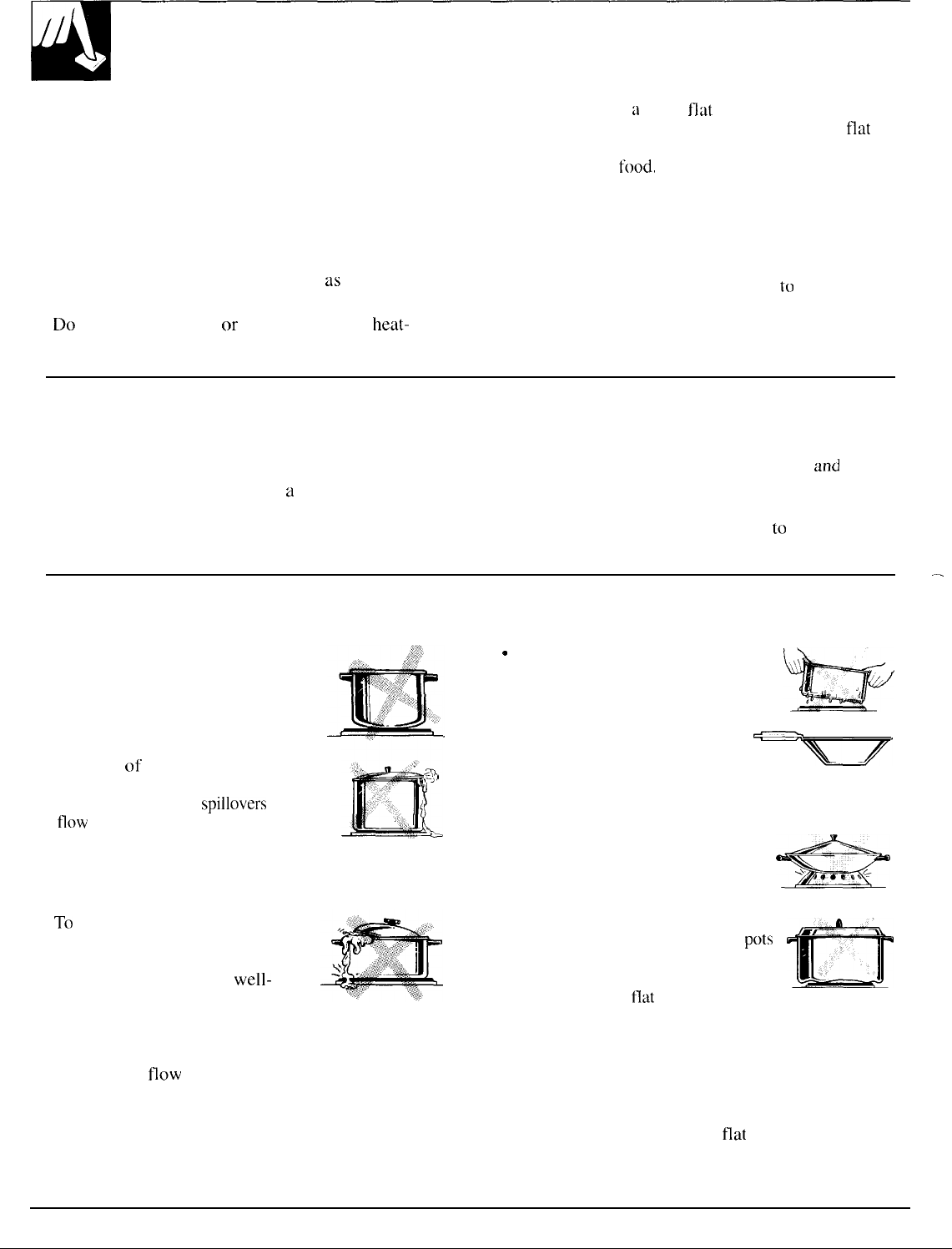
COOKWARE TIPS FOR
MODULE COOKING ELEMENTS
The use of appropriate cookware is very important
● Good pans have
a
thick,
iltit
bottom which absorbs
for cooking on open coil, solid disk element or
the heat from the cooking element. The thick,
flat
radiant modules.
bottom provides good heat distribution from the
● Aluminum cookware conducts heat faster than
element to the
food.
This cooking process requires
other metals.
little water, fat or electricity.
● Cast iron and coated cast iron containers are slow to
●
Pans with uneven bottoms are not suitable. Pans
absorb heat, but generally cook evenly at minimum
with thin,
uneven bottoms do not adequately utilize
heat settings.
the heat coming from the cooking element. The
food to be cooked may burn and require more time
● Glass cookware should be used only
as
the
and electricity. You would also have
to
add more fat
manufacturer describes.
or water.
●
Do
not use a wire rack
or
any other kind of
heat-
retarding pad between the cookware and the element.
How to Check Pan Performance on a Module Element
1.
Put I inch of water into the pan.
3. A uniform pattern of bubbles across the bottom
2. Bring water to a boil and observe the pattern of the
of the pan confirms a good heat transfer
and
a
bubbles as the water comes to
a
boil.
good pan.
4. Bubbles localized in only a portion of the bottom
indicate uneven contact of the pan
to
the element,
uneven heat transfer or an unsuitable pan.
.—
Cookware
● Don’t use pans with rounded
bottoms. They don’t have enough
contact with the cooking element
to cook properly.
● Use pans
of’
the correct diameter
only. They should be slightly larger
than the element so
spillovers
will
tlow
onto the cooktop and not bake
onto the element. A damp cloth is
sufficient to remove the spill. Pans
should not overhang more
than 1 inch beyond the element.
●
To
optimize cooking time and
energy usage, you should use a
pan that is sized correctly for the
cooking process, with a
well-
fitted lid to avoid evaporation
loss, and cook with as little water
or fat as possible. If the pan is too
small, energy is wasted and
spillage can
flow
onto the
element.
12
ti
:;;::.::::..,...,
.,.:,;::,::::.:$
,..::.:,....
.:,
&
..,
,,
“
+
,,
,,.,,,
*
Place only dry pans on the elements.
Do not place lids on the elements,
particularly wet lids.
~
● We recommend that you use
only a flat-bottomed wok. They
are available at your local retail store. The bottom of
the wok should have the same diameter as the
element to ensure proper contact.
● Do not use woks that have support
rings. This type of wok will not
heat on the cooking elements.
e
●
Except in pressure cooking with water
and water-bath canning, canning
pots
should not extend more than 1 inch
beyond the surface of the element
and should have
flat
bottoms. When
canning pots do not meet this description, the use of
the HI heat setting causes excessive heat buildup and
may result in damage to the cooktop. See the Home
Canning Tips section for further information.
●
Some special cooking procedures require specific
cookware such as pressure cookers, deep fat fryers,
etc. All cookware must have
flat
bottoms and be the
correct size. The cookware should also be covered,
if applicable to the cooking process.


















